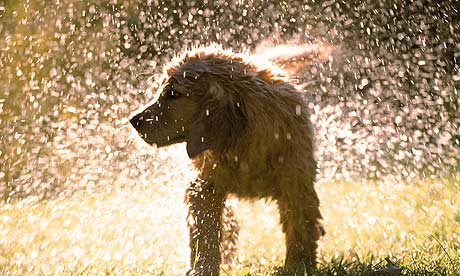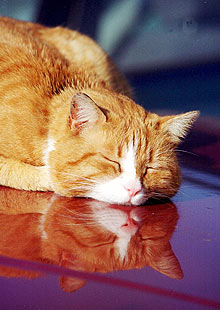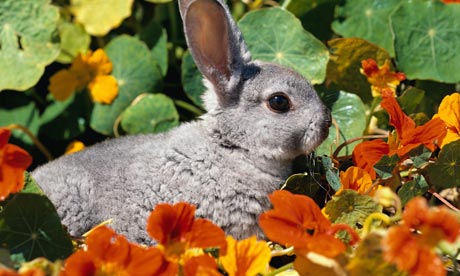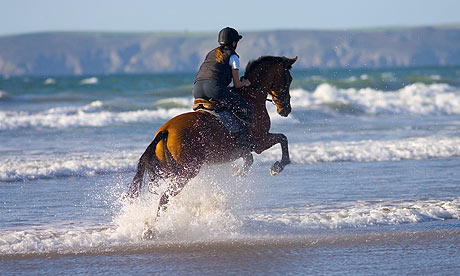How to keep pets cool on hot days
Pets rely on their owners to keep them safe during heatwaves. Rachel Dixon offers a brief guide to what you should and shouldn't be doing as the temperature soars
What does your pet like to do when it's sunny? How do you stop it getting too hot?
What does your pet like to do when it's sunny? How do you stop it getting too hot?

A dog cooling off in the garden on a hot day. Photograph: Alamy
Britain is in the grip of a heatwave, and measures have been introduced to protect vulnerable groups, such as older people and young children, from its effects. But what about another at-risk group: our pets?
You may think that looking after your pets in hot weather comes down to common sense, but as the death of two police dogs this week shows, it never hurts to go back over the basics. So here's a brief guide to keeping dogs, cats and other common pets cool this summer.
Dogs
Dogs aren't much good at keeping themselves cool, so you'll need to help them. Here's how:
Don't leave your dog in a car, even for a few minutes. An open window or a windshield screen isn't enough to keep the car cool. According to the RSPCA, if it's 22C outside, within an hour it can be 47C inside a car. Dogs die this way every year – don't let yours be one of them.
Don't even leave your dog in a glass conservatory or a caravan. The same rules apply as for cars.
Do provide your dog with plenty of water, both in the house and on walks. If you are leaving your dog at home alone, make sure its bowl can't be knocked over.
Do keep one room in your house cool and well-ventilated by drawing curtains and opening windows if there is a breeze, so your dog can lie down there if it is getting hot.
Don't leave your dog outside all day. If it is unavoidable, ensure it has shade and water and check on it regularly.
Do keep an eye on your dog if it is outside. Animals will try to drink anything if they are thirsty. For example, they like the sweet taste of anti-freeze.
Don't take your dog for a long walk in the heat of the day. Go in the early morning or late evening, and make the walk shorter than usual.
Do apply pet sunscreen if your dog has a light-coloured nose or ears. Mammals burn just like humans, and can even develop skin cancer.
Do have long-coated dogs clipped, and groom all breeds regularly.
Don't treat all dogs equally. Take extra care with fat or muscular dogs, those with short or flat noses, long-haired breeds, young puppies, old dogs, and those with a disease or who are on medication.
Don't ignore the signs of heatstroke. The RSPCA has issued a checklist: heavy panting; profuse salivation; a rapid pulse; very red gums/tongue; lethargy; lack of coordination; reluctance or inability to rise after collapsing; vomiting; diarrhoea; loss of consciousness in extreme circumstances.
Do take immediate action if your dog is displaying any of these symptoms. Cool it down gradually and then take it straight to the vets – heatstroke can be fatal. To cool your dog, douse it in cool water (not cold) and let it drink small quantities of cool water, until its breathing has steadied.
Do take immediate action if your dog is displaying any of these symptoms. Cool it down gradually and then take it straight to the vets – heatstroke can be fatal. To cool your dog, douse it in cool water (not cold) and let it drink small quantities of cool water, until its breathing has steadied.
Do be aware that up to a third of dogs may suffer from hayfever, which can lead to skin irritations that could become infected. Take your dog to the vet if it is scratching excessively.
Cats
 A sleepy cat. Photograph: Roy Yuval/AP
A sleepy cat. Photograph: Roy Yuval/AP
Cats enjoy warm weather. They are also good at keeping themselves cool if necessary, with a little help from humans (soperhaps they are intelligent after all). Here's how to help protect them from excessive heat:
Don't let your cat go outside between 10am and 3pm.
Do apply a pet sunscreen, which can't be licked off, to the nose and ears of pale-coloured cats when they do go outside.
Do keep the blinds closed and the curtains shut to keep the house cool for your cat. Keep the windows closed if it is hotter outside than in.
Do let your cat choose a cool place to lie down. They will naturally gravitate towards a slate floor or a fan in summer, just as they will curl up in a warm place in winter.
Do provide your cat with plenty of water, in various positions around the house. Cats often prefer their water to be placed away from their food.
Don't worry if your cat is sleepy during the day. Cats need 16 hours of sleep a day and will sensibly nap even more on a hot day, rather than rushing around getting hotter.
Don't worry if your cat seems to be grooming itself more than usual. This is a cooling mechanism similar to sweating: as the saliva evaporates off its fur, the cat will cool down.
Do pay attention to your cat's feet. Cats, like dogs and mice, have their sweat glands on their paws. If your cat is leaving wet paw prints, it is sweating and will need to replenish its fluids. You can try cooling it down by dipping its paws in water, but this may not be appreciated …
Don't worry if your cat starts panting. Cats pant more rarely than dogs, but will pant to take on cooler air if they are particularly hot. Heavy panting could be cause for concern, however (see heatstroke, above).
Small furries
 A rabbit in a flower-filled garden in summer. Photograph: Getty
A rabbit in a flower-filled garden in summer. Photograph: Getty
Don't get lax with hygiene: hot weather results in more flies and maggots and can lead to flystrike, an often fatal condition that affects rabbits.
Do groom your pet and brush out loose hair. Consider having long-haired rabbits and guinea pigs trimmed for the summer.
Do keep hutches and runs in the shade all day. Move them as the sun moves round if necessary.
Don't keep the hutch on the ground: improve ventilation by putting it on bricks or similar.
Do keep water topped up, and be extra-vigilant about evaporation.
Do give small animals pieces of water-rich fruit and vegetables, such as celery and apple, to keep them hydrated.
Do provide a ceramic tile or a frozen bottle of water for your pet to sit or lean on.
Do use a misting spray to cool off larger pets, such as rabbits. This can be used on dogs, too - remember to avoid the face.
Horses
 A horse and rider cool off in the sea. Photograph: Tim Graham Photo Library/Getty
A horse and rider cool off in the sea. Photograph: Tim Graham Photo Library/Getty
Do provide your horse with plenty of water and a salt lick.
Don't leave your horse in a field without any shade.
Do protect your horse from flies. Consider investing in a fly fringe, an anti-fly rug and some fly repellant.
Don't let your horse put on too much weight from the lush summer grass. Overweight horses are more at risk of overheating.
Do keep your horse's feet hydrated - ask your farrier for advice.
Don't let your horse's muzzle burn. Use a suitable sunscreen on it and other areas of exposed skin.
No comments:
Post a Comment